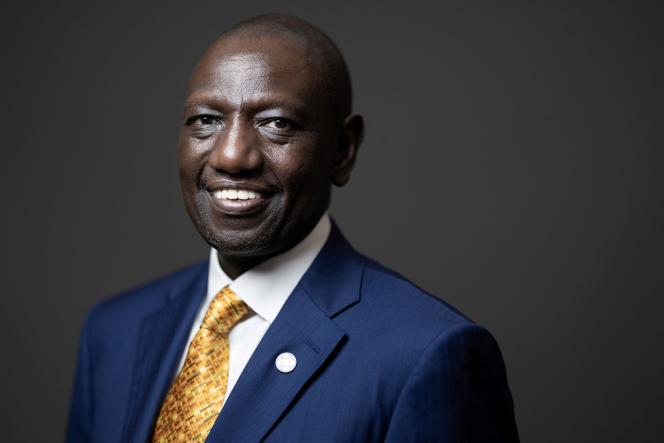IHe arrived, alone and all smiles, at the wheel of a funny little electric car – a garish yellow yogurt pot made in China, a far cry from the roaring 4x4s in which he is usually driven. William Ruto did not just brilliantly master his entrance on stage at the opening of the African Climate Summit, which he hosted in Nairobi from September 4 to 6: he also pulled off a masterstroke at its closing, by extracting a common position from African countries in the next international climate negotiations, particularly in view of the COP28 in December in Dubai.
In one year in power, William Ruto, a dynamic fifty-year-old and accomplished businessman, has established himself as a strong African voice on the international scene. On the climate first, with a notable intervention at COP27 in Sharm El-Sheikh, in November 2022, just a few weeks after taking office. Then on the functioning of global finance, highlighting the failures of the Bretton Woods institutions and the pressures induced by the hegemony of the dollar on the budgets of African states. In Paris, in June, this trusted ally of Europe and the United States did not hesitate, during an energetic exchange, to shake up Emmanuel Macron on the subject of a global tax on financial transactions.
Neither the climate, nor the mysteries of global finance, nor pan-Africanism were at the heart of William Ruto’s campaign. Coming from a modest background and becoming one of Kenya’s richest people, he won the 2022 election by promising a reduction in the cost of living for the poorest, “little resourceful people” (there Hustlers Nation) who make up the majority of the population, struggling every day to feed their families in a context of economic slowdown and inflation. Managing to present himself as an outsider of the system, the man who had been vice-president for ten years promised jobs for young people and a reduction in food prices.
A year later, many Kenyans are grimacing. In a recent poll, 75% of respondents believe the country is heading in the wrong direction. Of course, inflation is slowing (+6.7% in August, year-on-year) and certain prices have fallen slightly, but those of flour (corn is the basis of meals) and beans have increased.
“The promises were too big”
“ The picture is mixed, with a few pockets of success here and there”estimates economist Kwame Owino, director of the Institute of Economic Affairs, emphasizing that cheaper fertilizers were delivered to farmers – another strong commitment of the campaign. “ The promises were too big. At the end of this first year, we have something that is not up to what people expected in view of the campaign”, he adds, pointing to tax measures as the big “shadow in the picture” from the point of view of citizens.
William Ruto inherited a country whose currency is crumbling against the dollar and at risk of default on its public debt (around 64 billion euros, more than 50% of state revenue going to its repayment). Contrary to promises, the government has increased new taxes to meet its deadlines, he says, and maintain the support of the International Monetary Fund (IMF) and the World Bank. Doubling of VAT on fuels, 1.5% tax to build affordable housing, 50% increase in the price of electricity, 35% tax on the highest salaries, etc. “ They will end up taxing the air we breathe,” exclaimed Kalonzo Musyoka, an opposition figure, whose days of demonstrations resulted in dozens of deaths.
The Kenyans ended up nicknamed the very religious head of state “Zakayo”, after Zacchaeus, the obstinate tax collector of the Bible, while the Daily Nation dedicated the cover of its Sunday magazine in mid-August to “lord of taxes”, portraying the president as a merciless gladiator armed with an axe.
The Ruto administration has embarked on an aggressive tax collection campaign (which relatively few people pay, either because they work informally or manage to evade it) and has promised to fight corruption. To the attention of corrupt businessmen, the president recently gave three “options”: “Mambo ni matatu [« il y a trois choses » en swahili] : leave Kenya, go to prison, go to paradise. » Despite the force of these barely veiled threats, the “mambo ni matatu” quickly became a viral joke revisited in all sauces, but the release also revived the historically sulphurous image of the president, so polished internationally.
“Wilful” violations of the Constitution
After the post-election violence of 2007-2008, he was prosecuted by the International Criminal Court (ICC) for crimes against humanity – charges ultimately dropped. According to Sheila Masinde, local director of the NGO Transparency International, the first year of the Ruto administration (himself accused several times in the past of corruption or land appropriation, which he has always denied) was notably marked, “despite efforts” by “deliberate violations of the Constitution” And “human rights abuses”.
“William Ruto has several facets and these different facets are not mutually exclusive”, observes a diplomat in Kenya. As such, she considers it possible that the Head of State will be convinced by the climate emergency – “agronomist by training, he is, for example, very aware of Kenya’s vulnerability in terms of food security” – while looking for economic opportunities. At the Nairobi summit, the president pleaded for the protection of carbon sinks. “They have the potential to absorb millions of tonnes of CO₂ per year, which is expected to translate into billions of dollars” of income in carbon credits, he assumed during one of his speeches.
Partner service
Online English courses with Gymglish
Learn English in 10 minutes a day with fun, personalized lessons
Discover
During another intervention, William Ruto pointed out “speed, volume and affordability” like the “three important things” for green financing for Africa. “As they say in Kenya: “mambo ni matatu””, he insisted, in a pirouette that drew a chuckle from the hushed floor of the room.
